
The College Search– An Introduction
As you begin your college search and try to find a college that fits, you’ll undoubtedly face lots of questions. Do you prefer a suburban college, rural colleges or urban colleges? What’s your preferred college major? Is your ideal college size big or small? What are you looking for in campus culture?
In our “College Finder” series, we’ll help you answer all of these questions and more.
To begin with, in the first article of this series we’ll talk about when you should start your college search and how to research colleges. We’ll share:
- Links to helpful college search tools such as a college search quiz
- Websites and other resources that are valuable sources for college information
- Suggestions on the best ways to gather and organize your college information
Then, the second article in the College Finder series will cover how to turn your college search into a well-balanced college list. A balanced list has an appropriate distribution of safety, target, and reach schools. We will also provide a sample college list.
Finally, the third article in this College Finder series will help you review and compare the schools that accepted you and make your final college choice.
Together, the College Finder series of articles are a college guide you can follow from start to finish as you conduct your college search.
So, let’s get started! In this “College Search” article, you’ll learn when and how to conduct a college search. We’ll walk you through tools to help you find the right college and strategies to gather and organize your college information.
When should you start searching for colleges?
You should begin learning about colleges as early as possible. Most students begin their college search around their sophomore year or early in the junior year of high school.
Try to have a list of 20-30 colleges you like by December of your junior year. Then, in the spring of your junior year, you can schedule some college visits. If you can’t visit in person, check to see if the school offers virtual college tours.
However, before you begin your college search, take some time to think about your personality, interests, and goals. Is there a college major that piques your interest, or a college setting that feels exciting? Beyond academics, are there extracurriculars you plan to pursue in college?
In your sophomore or junior year, try a college search quiz like the College Personality Quiz, the College Matchmaker Quiz, or the Right Fit Quiz to help you find the right college.
Start your college search early so you feel less overwhelmed about finding the right college. Presently, let’s look at the criteria you should consider in your college search as well as some helpful college search tools.
What is the best way to search for colleges?
Want to know how to research colleges? Online college search tools are one of the most effective ways to begin a college search. And there are loads of college search tools to choose from. In fact, there are so many options that choosing from all the college search tools might feel hard at first.
If so, then a good starting point is the CollegeAdvisor college search tool. This lets you sort schools by location, acceptance rate, tuition, college size, and more. Once you find a college you are interested in, you can then view its application requirements and add it to your “My Colleges” page on the CollegeAdvisor site.
Check out our webinar, “Researching Colleges Virtually”, for further guidance on the college search, including virtual college tours.
Remember that certain criteria are critical if you want to find a college that suits your needs, interests, and goals. These include college setting, college size, campus culture, and your intended college major, among others. You may also want to consider whether distance from home, geographic location, and rural colleges or urban colleges are important to you.
We will discuss other college search tools in the next section, including the College Board college search. The College Board college search tool and similar tools can be helpful as you begin your college journey.
However, remember that the internet isn’t your only method of research! College counselors at your high school, college advisors, college guides, and college fairs can also give you quality college information.
College Search: How to research colleges?
It’s important to realize that there are many ways to find a college that fits with your goals and priorities. Finding the right college will probably involve many college search methods including: a college visit, college information on websites, college search tools, a college guide, and more.
In some cases, you’ll get the most useful college information from the school itself. After all, a college visit or virtual college tours can tell you a lot. However, in the early phase of your college search, it can be most helpful to research colleges by using online college search tools to compare schools and narrow your options.

College search tools are also useful when you want to find specific college information. They are accessible, free, and easily searchable for students who want to find a college.
For example, you can access the CommonApp college search tools from August 1st of your senior year. With this college search, you can find college information for over 1,000 schools in the United States. You can do a college search for the college setting and college size you want, as well as many other metrics.
Another example of the college search tools is the College Board college search tool called BigFuture. BigFuture provides college information for well over 3,000 colleges, including some outside of the United States.
Using this College Board college search tool, you can find a college based on college setting or college major. You can also use the College Board college search to filter criteria like affordability, admission rates, and types of credit offered. BigFuture also offers other helpful college information, as well as tools for exploring careers.
Another college search tool to consider
Like the College Board college search tool, the College Scorecard is one of the top college search tools to help you find the right college. The US Department of Education created this college search tool. In addition to college information for over 5,000 schools, it also provides information on apprenticeships and job training programs.
Another helpful source of college information for your college search is College Navigator. The National Center for Education Statistics (NCES) created CollegeNavigator to help you find the right college with easily searchable key criteria. Conveniently, this tool helps students to build and compare a list of schools within the site, and then export that list to their own college search spreadsheet.
Building a college search spreadsheet
Once you’ve completed a college search quiz or two and found college information from various college search tools, it’s time to make a college search spreadsheet. You should use a college search spreadsheet to help keep your college information organized. Your college search spreadsheet will likely look different from students. This is because it will be tailored to your individual needs and priorities. Your CollegeAdvisor admissions expert can help you customize your college search spreadsheet.
It should include the most important categories of college information, such as:
- Name
- Location (city, state) and college setting (e.g. suburban college, urban colleges, or rural colleges)
- College size
- Cost
- Financial aid details
- Application deadline
- Supplemental essays
- Average SAT/ACT scores
- Average GPA
- Admissions chances (reach/target/safety)
- Interest level (how excited you are about this school)
In addition, include links to key pages on school websites in your college search spreadsheet. These may include pages on the cost of college, finances and activities and programs of interest.
You could also have a “notes” column on your college search spreadsheet. You can use this to note down college information that doesn’t fit elsewhere on your college search spreadsheet. For example, you may want to note the name of someone you know at the school, or an admissions officer you met, or something about the campus culture.
Gathering all the college information you need
As you complete your college search spreadsheet or build a college list through these college search tools, you’ll find a lot of college information. This college information can come from any of the college search tools we mentioned, like the College Board college search or the CollegeAdvisor college search. But you can also use college guides, college counselors, a college search quiz and more!

As you go about finding the right college, make sure you use your needs, preferences and goals. You can use your own profile to work out whether a school fits and is a safety, match, or reach.
When you find a college you like, look up the average GPAs and test scores for enrolled students. Then, use this information to see how you compare. For instance, if you scored 400 points above the average SAT at a given school, you can enter it as a “safety” school on your college search spreadsheet.
It’s important to realize that as you class schools as “safety”, “match”, and “reach”, you must consider college size and acceptance rates. For example, a selective liberal arts school will seldom be a safety school. Nor will an Ivy League school, even if your GPA and test scores are within the range of admitted students. College guides and your CollegeAdvisor admissions expert can help you determine which schools fit into which of these categories for you.
Example of College Search Spreadsheet
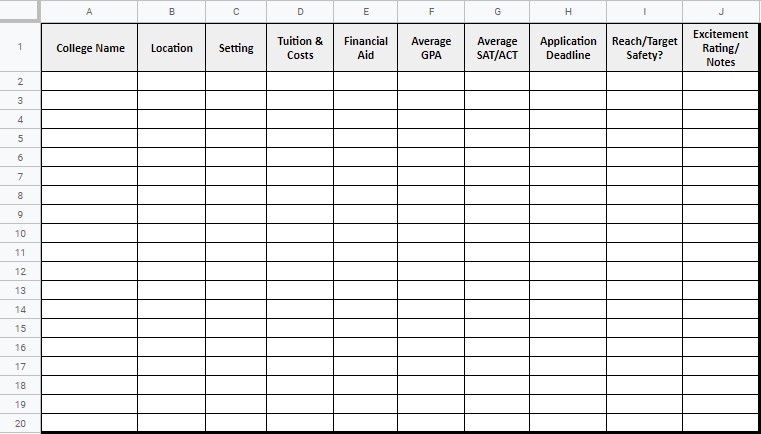
Common College Search Questions
1. What is the best advice on how to research colleges?
Many students are unsure or overwhelmed about how to research colleges. So, here are our top tips for finding the right college.
- Use a variety of tools: Online college search tools are convenient and a great place to begin your college search. As you’ve seen, there are plenty of college search tools that will help you find a college you’ll love, such as the College Board college search tool. However, college guides, college websites, guidance counselors, and current or former students will have plenty of college information that helps you find the right college.
- Know what’s most important to you. As your college search will show you, there are many wonderful colleges out there. However, finding the right college for you is the goal. Are you more interested in urban colleges or rural colleges? What college major excites you? If you are not sure, take a college search quiz to narrow down your options.
- Listen to advice from recent college graduates. Still feel like you could be overlooking something? Here’s what 20 recent college graduates wish they had known during their own college search and application.
2. How do I find a college’s GPA requirements?
College websites usually include college information on the average GPA and test scores for admits. In addition, most college search tools also include both averages and ranges for these criteria. For more college information on GPA requirements, check out this CollegeAdvisor college guide.
3. How do I find a college for the college major I am interested in?
We’ve created a college guide of the best schools for a variety of college majors. You will find the college guide for architecture schools here, the college guide to business universities here, and the college guide for top engineering colleges here. In addition, we also have a college guide for the best liberal arts colleges here.
4. How can I find my dream school?
Take a college search quiz (or two!) to define what your dream school looks like. We suggest the College Personality Quiz, the College Matchmaker Quiz, or the Right Fit Quiz. Remember that your dream school may be very different from that of your friends or your siblings. The college search is all about finding the right college for you.
5. What are college rankings, and what is a good college ranking?
In short, college rankings are annual lists of the best US colleges published by organizations like US News, Forbes, and the Wall Street Journal, among others. The methods behind each list vary, and they can change from year to year. By all means consult these lists as part of your college search – they can be a good starting point for finding the right college for you. However, these rankings are not totally objective, and many wonderful schools that may not appear on a “Top 10” list.
For more college information about rankings, check out this CollegeAdvisor “Expert’s Guide” and this “Best Colleges” guide.
6. What advice do you have for first-generation college students on how to research colleges?
If you’re the first person in your family to go to college (not counting older siblings), there is loads of college information out there to help you find a college and apply. A good place to start your college journey is with our college guide for first-gen students.
We’ve now discussed when and how to research colleges, specific college search tools, a good college search quiz, and how to organize your college information in a college search spreadsheet.
Now, we’ll walk you through each element of the college search in detail, from the college setting, to the college visit, college culture and more!
Finding the right college
We’ve talked about how to find a college, including how to build a college search spreadsheet and how to consider factors such as location, college major, tuition, average GPA, and acceptance rate. Now, how can you use all of that college information to find the right college for you?
Let’s dive into the next part of this college guide to help you find the perfect school.

Finding the right college means using the college information you’ve learned and applying it to you. If you’re wondering how to find a college, it starts with self-reflection. What do you want from a school? What matters most to your college experience? Remember, finding the right college takes time and consideration.
Lucky for you, there are many college search tools and college fit finders that will help you to find the right college for you. You can take a college search quiz, use a college finder, or read a college guide. You can even check out schools’ campuses by taking virtual college tours.
Using these college search tools, you’ll learn a lot about different schools and how they function. However, you should also ensure that the college itself is right for you—not just its programs. Check out this webinar on how to research colleges beyond just academics or college major.
Reflect on your interests
As you research, think about what sparks your interest. What activities or sports do you hope to pursue during college? Do you want to major in a particular area? Can you see yourself studying abroad? Consider these questions, and any others, so that you can find the right fit. After all, it will be hard to find the right college if you have no idea what you want.
Also, while college search tools are helpful, they can’t make the final choice for you. A college finder or college guide can help with the college search, but you should always think about your plans and discuss them with those you trust.
Try not to build a college search around stereotypes and prestige. Remember that your college will be your home for the next four years: the place you live, study, and work. You want to make sure that you find the right college for you, one with a comfortable environment where you can excel.
College search quiz
Using college search tools, taking a college search quiz, and utilizing a college fit finder can help you to figure out what’s out there. You can also look at various college guides for details.
Remember that there likely won’t be only one “right college.” Many students have a dream school, but there are hundreds of colleges out there. Finding the right college can be stressful, but rest assured that you will have a great time at whatever school you choose.
Want some more useful college information? Check out what our team wish they knew when they were trying to find a college. Next, we’ll dig into some considerations to take into account as you find a college.
Considering college setting in your college search
One key factor when trying to find a college for you is location. Can you see yourself living in a big city for four years? Or do you prefer to be in a small town?
While some schools may take full advantage of their location and have a tight connection to their town or city, others may not. This will play a large part in your college experience. To learn more about the college setting and campus culture, speak to current students. They’ll offer the most useful information about campus life.
To talk to current students, you can sign up for college visits, information sessions, or virtual college tours. You could also reach out to your college counselor (or our team at CollegeAdvisor.com) for more details.
At CollegeAdvisor.com, we often host college panels with current students from various schools. This is a great way to get an insider perspective on what makes a school unique.
So what exactly are your options when it comes to location? In general, you’ll find urban colleges, rural colleges, and suburban colleges. Each school will have its own relationship to its location, so you should always visit if possible. This will help you gather as much college information as possible.
Let’s dive into what each location really means and how that applies to your college search.
Urban colleges
Urban colleges are those that are located within a large metropolitan city. Boasting an exciting location, urban colleges can provide students many work and internship opportunities. However, big city life isn’t for everyone. Some may find urban colleges overwhelming. After all, the campus culture is different from that of a rural or suburban college. Examples of urban colleges include:
University of California- Los Angeles (UCLA)
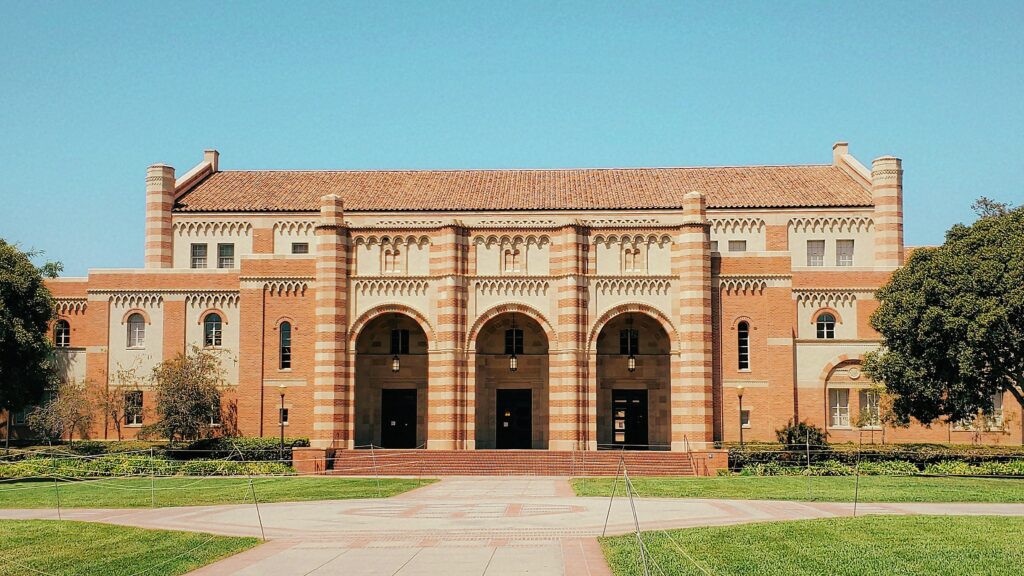
Located in the heart of LA, artistic students will be inspired by the creativity that surrounds them. At UCLA, students are encouraged to connect with the diverse local community. LA is an incredible city, with plenty to offer future filmmakers and Silicon Valley analysts alike. However, the campus culture at UCLA is less tight-knit than at smaller schools, and its urban feel may not serve some students.
University of Chicago
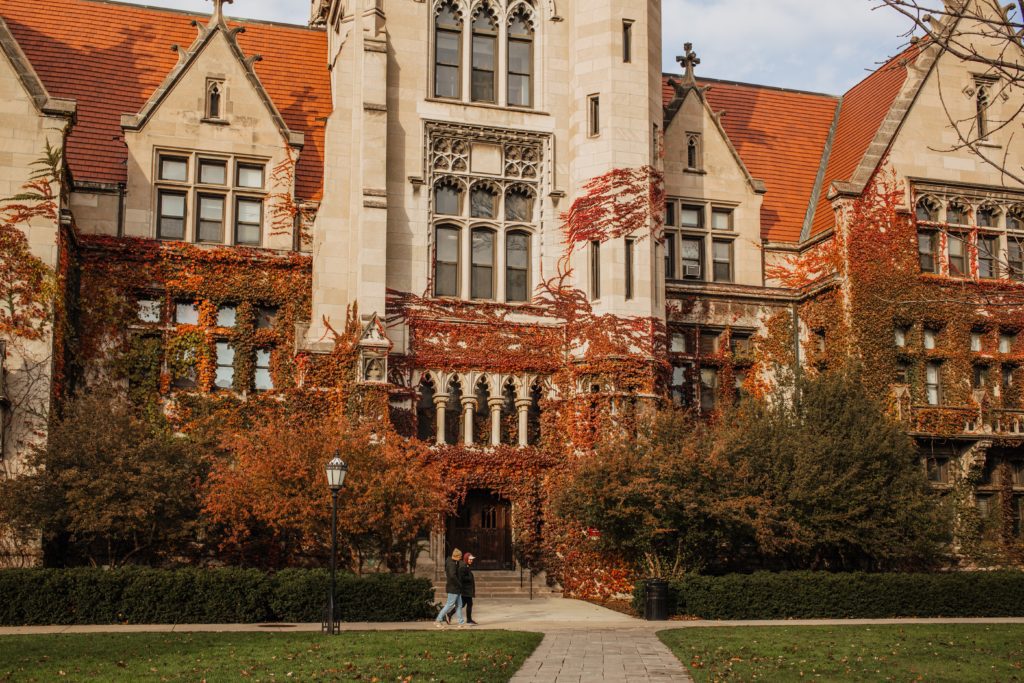
With its campus in Hyde Park, UChicago is a top-ranked school with world-class programs in all fields. The enrollment sits at about 14,000, with a 5:1 student-to-faculty ratio. This gives students access to a major American city while still receiving individualized attention in class.
University of Washington

UW finds its campus in Seattle, Washington. For many, UW is a commuter college; this can make finding community on campus more challenging. However, students tend to love it here. About 75% of UW’s graduates stay in Washington upon graduation.
Suburban College
A suburban college will be found in a setting that is neither rural nor urban – think towns (small or large) or residential areas. A suburban college can often create a tight-knit campus culture. However, suburban schools aren’t for everyone. Some students may find they lack a sense of culture, diversity, and opportunities that can be found easier among urban colleges. Suburban college examples:
Princeton University
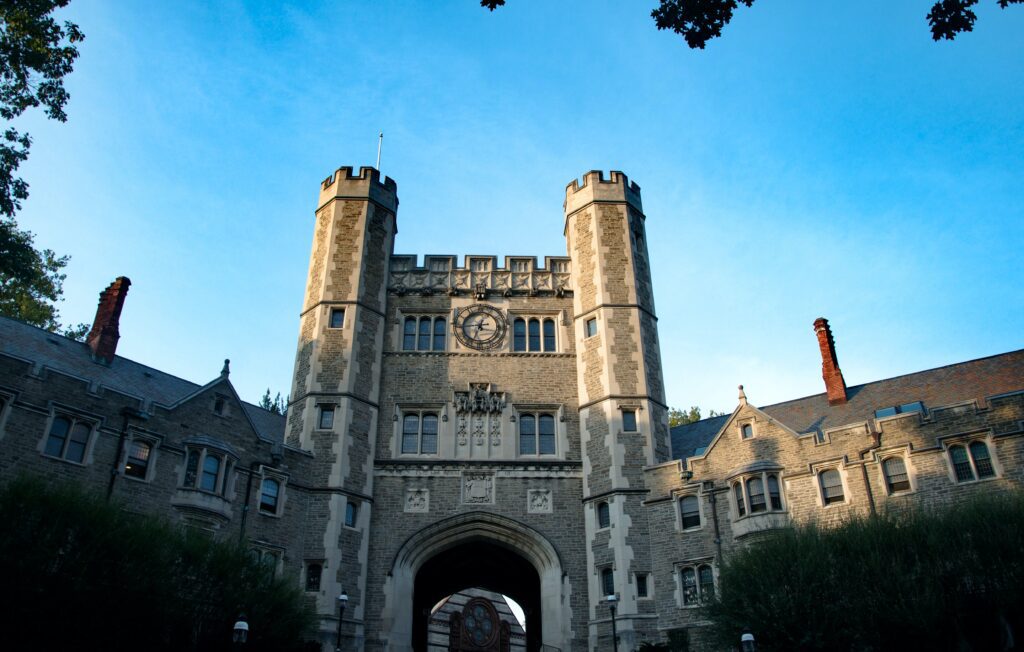
This prestigious school also happens to be a suburban college. Students will enjoy a thriving community on campus and various opportunities in the area. However, some students may find themselves wanting easier access to a larger city.
Wake Forest University
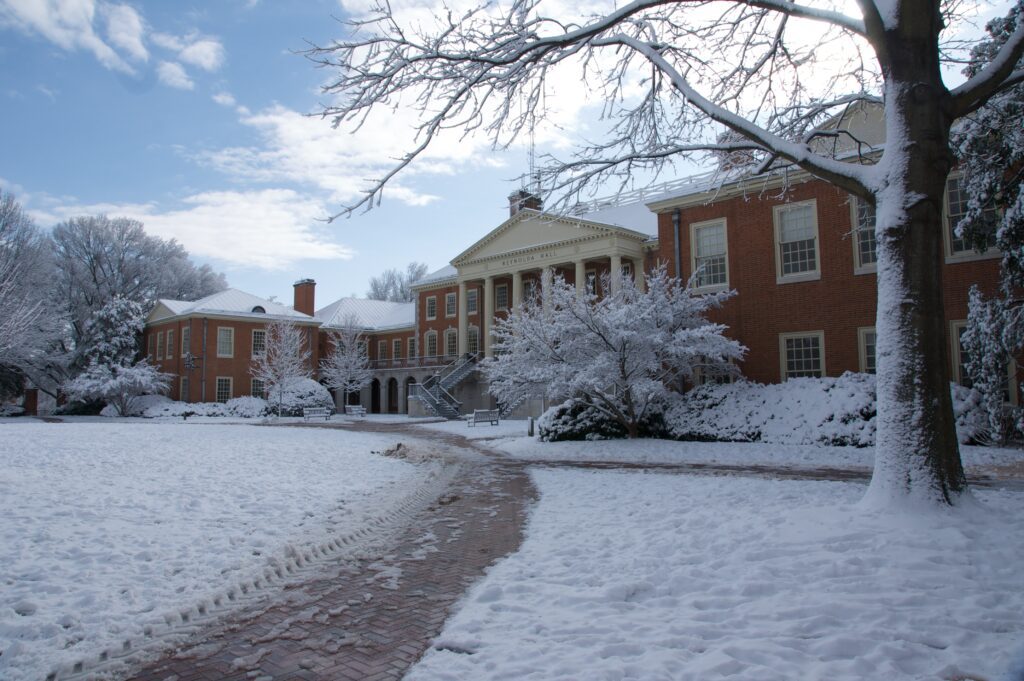
With its low student-to-faculty ratio, this private suburban college in North Carolina, just outside the suburbs of Raleigh, will offer students personalized attention. With easy access to the outdoors, Wake Forest can be a great choice for many students.
Northwestern University
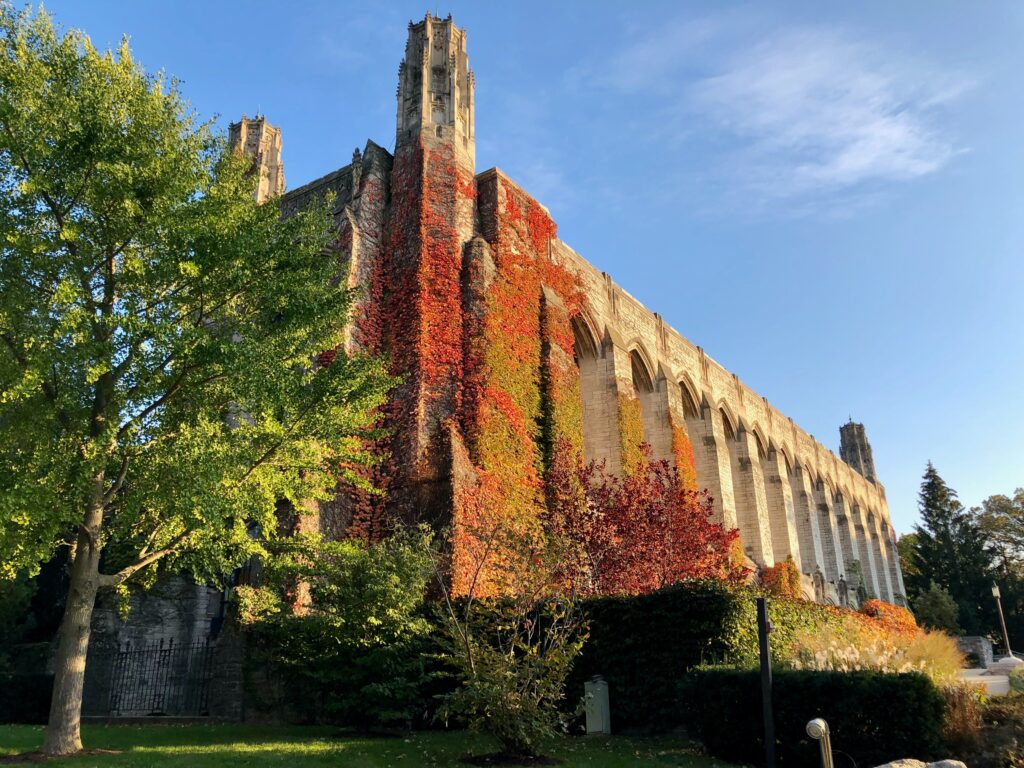
Located in Evanston, Illinois, this suburban college seems to have it all: a college town vibe, beautiful lakeside location, and quick access to a big city.
Rural Colleges
Rural colleges are found in small towns or in the countryside. Easy access to nature and a quieter setting creates a rural setting appealing to many students. You’ll usually find a tight-knit college community. However, being far from a large city could mean fewer outside internship or networking opportunities. Examples of rural colleges include:
Dartmouth College
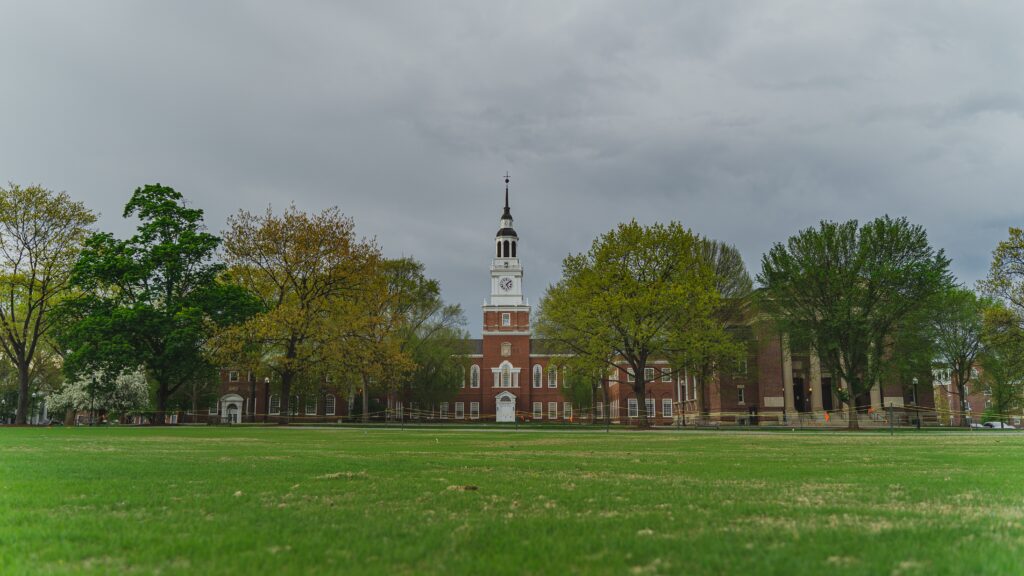
As a member of the Ivy League, Dartmouth College is located in Hanover, New Hampshire. Although the campus is tucked away in the White Mountains, there are many opportunities on campus. However, some students who grew up in the suburbs or near the bustle of a city may find themselves wishing they had a larger city nearby.
Cornell University

Located in Ithaca, NY, this elite university is also a member of the Ivy League. Cornell University offers a picturesque college setting for students craving a big dose of nature alongside their education.
University of Virginia at Wise
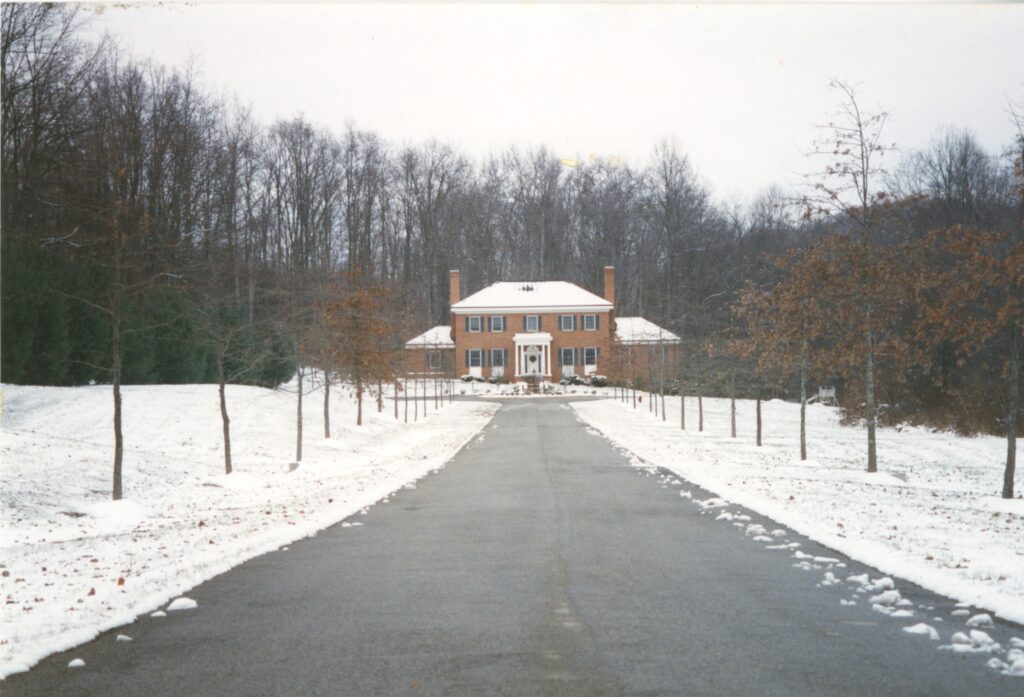
At this highly ranked university, students will enjoy bountiful opportunities on campus and quick access to beautiful nature (hiking on the Appalachian Trail and Blue Ridge parkway is just a brief drive away).
Finding the right college is tough, and college setting plays a major role. However, you will be able to study liberal arts, architecture, business, or engineering at many schools. You just have to find the right college setting for you.
Ready to start your research? Search the best colleges using U.S. News’ college finder.
When should you start visiting colleges?
There is one thing that no college search tools, college fit finder, college ranking, or college search quiz can tell you: how you feel on a college’s campus. For that, you’ll have to ditch your college search spreadsheet and head out onto the field for a college visit.
You may think that an online college finder, combined with your extensive research, has found you your dream school. However, the best way to understand a college setting and find the right college for you is through a college visit. While virtual college tours are helpful, an in-person college visit is ideal.
Start your college visits early
Think of it like the admissions process: the earlier you start, the more successful you will be in your college search. You can start with virtual college tours to get an idea. Then, move on to in-person college visits to find a college that suits your needs. An in-person college visit will add dimension to your college information from online research and virtual college tours.
Some students begin with a college visit as early as freshman year. Even if you aren’t sure about your college major, seeing the college setting will help you understand the campus culture. Add your experiences and findings to your college information and research.
Finding the right college can’t just be done behind a computer. However, you can ease into the tour process with virtual college tours. Still, at the very least, try to visit any school before applying or committing to enroll.
If you can’t start super early, at least begin your college tours by your junior year. Plan ahead if you’re looking to apply Early Decision. You shouldn’t enter a binding agreement to attend a school without having done a college visit. By senior year, you can finalize your list in order to find a college for you.
Next, let’s look at some more college information.
Why is college location important?
As mentioned, the location has a major impact on your student experience. You may have noticed many of these differences between the rural colleges, suburban colleges, and urban colleges we discussed.
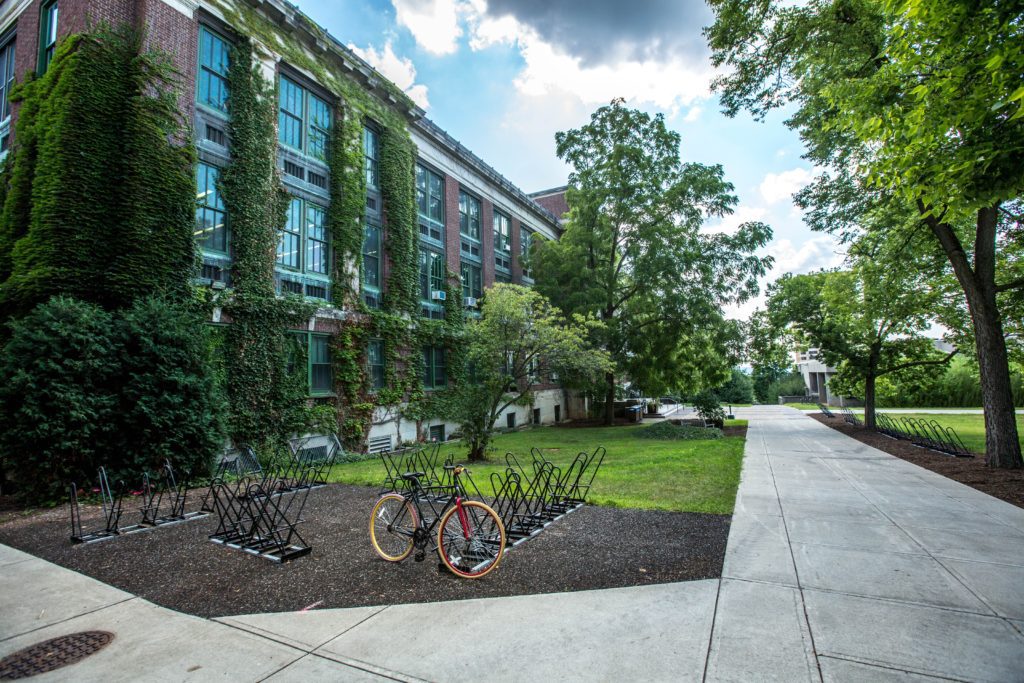
With this in mind, location plays a huge role in campus culture. Size and location often work hand-in-hand to create the campus feel. Some schools may feel tight-knit, while others leave students feeling more anonymous. You may not get a sense of these differences on virtual college tours, so try to visit in person.
At rural colleges, your opportunities may be limited to those offered on campus. However, you’ll often be part of a closer-knit community. At an urban or suburban college, you can take advantage of opportunities in the cities and nearby. If you have time, you can also spend more time exploring life off campus.
Graduates of any given school tend to stay in the area – not always, but often. If that’s the case, then career planning will play a role in your college location decision. For example, if you want to work in film in Los Angeles, start looking at schools there. You could make connections that may help you later.
What else should I consider in my college search?
Beyond the basics of location, let’s look at some more things you’ll think about when choosing a college.
In your college search, you may come across college consortiums or partnerships. These programs often create links between schools that allow students to work across universities and receive course credit. For instance, students at Harvard have access to courses at MIT.
Study abroad
You should also consider whether a school offers a study abroad program—for instance, a rural college may allow students to spend time in an urban area overseas. If study abroad programs matter to you, do some research. Does your college offer a study abroad option for your major? Or do they partner with a program that does?
Student housing options
Housing is a huge factor in campus culture. Do most students commute? Or are the majority of them living on campus or renting nearby? If you go on a tour, ask your college guide about students’ housing situations. At some schools, students may also take part in Greek life, which alters the housing environment. When in doubt, ask a current student. That way, you’ll get the most authentic college information.
Tuition and costs
Finally, as you find the right college, you’ll want to consider the cost. The cost of living can be incredibly high in some cities, which can make college life more challenging. On a college visit, check out the surrounding area. Look at the prices in an average restaurant or the cost of public transit to get an idea of the cost of living. Keep in mind that the cost of living may matter less if you receive room and board through your university.
Using college search tools will help you to find a college based on location. A college fit finder will let you select location preferences to help you find the right college. Ready to get started and learn more college information? Check out this college search quiz by Forbes.
College size, class size, and campus culture
Location is important in the college search, but the size of the university will also play a large role in your college experience. To find a college for you, think about college size, class size, and campus culture.

Let’s look at how all these factors could affect your experience.
A college guide will often break down schools by their sizes. After all, size plays a large part in the college search. Think about your ideal academic community. How large are your classes? Do you want to take more lectures or seminar courses? Do you want to get to know your professors? Often, smaller schools will offer a more intimate learning environment. This means smaller classes and lower student-to-faculty ratios.
Now, let’s think of your extracurriculars. What types of activities do you want to take part in? Does the number of campus clubs matter to you? Do you want to play sports? Would you like your school to have Greek life? Larger schools will often have more athletic programs, clubs, sororities and fraternities, and student support.
Next, think about your social life. Do you want to walk through campus and know almost everyone? Then, you may want to attend a small liberal arts school. Do you not mind seeing a single familiar face as you wander the grounds? Do you prefer a “party school”? You’re likely leaning towards a larger university. What about religion on campus? Is that an important thing for you to have available?
Factor all these things into your college search and you’ll be sure to find the right college for you. Finding the right college takes time, but remember that you can succeed at whatever school you attend.
Next, let’s break down campus culture.
What is campus culture?
On your quest to find the right college, you should think about your ideal campus culture. So, what is campus culture, and why does it matter?
Campus culture refers to the social life on campus. As we’ve seen so far, location and size both play a large role in campus culture. Every school is different. So, most large, rural colleges will have a completely different campus culture than small, urban colleges. These factors will greatly affect your student experience.
For example, what’s campus culture like as a first-generation student? Is there ample support offered? Think about important services and experiences you’d like to have to help you find a college. A college visit or virtual college tours are the best way to further investigate potential fits.
Let’s use some examples to further explore campus culture and how it fits into your college search.
Harvard

As a prestigious, Ivy League school, you might think you know a lot about Harvard. But, what’s it like to be a student there? Do some digging, go on a college visit, and see how you’d feel on campus.
UCLA
Big city, big school, lots of opportunities. But how would it feel to live there? Would those factors be overwhelming or exciting? Check out these surveys about life on campus.
UT Austin

Considering attending UT Austin? You’ll find a diverse student body, with various support groups on campus.
Howard University
As the top-ranking HBCU in the nation, Howard is full of history, values, culture, and community. Check out this article to see if an HBCU could be for you. But remember, the best way to know is through a college visit.
Williams College
The #1 ranked liberal arts college in the nation by U.S. News, this small, private school will certainly offer a different campus culture than that of UCLA. Most students live on campus, and you’ll likely find a tight-knit community.
College Search: Final Thoughts & Next Steps
Now, you know when to start your college search. You also know how to search for colleges and evaluate factors such as size, location and campus culture. Finally, you’ve learned how to research colleges using college search tools.

Want to start looking for schools that meet your needs? Use a college search quiz, college fit finder, or College Board college search to find a college—or head to our own college finder!
Some final advice on the college search:
1. Start early
Finding the right college takes time – just like the application and admissions process. Don’t procrastinate on your college search. Remember that you don’t have to select a college major before finding schools. You can even apply undecided!
2. Use college search tools
Take a college search quiz. Use a college fit finder. You could even use the College Board college search. There are many college search tools that can aid you to find the right college.
3. Organized the college information you find
Start a college search spreadsheet where you organize schools by different priorities. You’ll update this often as you research.
4. Visit colleges if you can
Don’t wait until senior year to take a college visit. Take advantage of virtual college tours if you can’t go in person.
Keep an eye out for the next article in our College Finder series, where we’ll discuss how to use your research to build your college list. And remember, if you need extra support, CollegeAdvisor.com is here to help you with your college search.

This guide was written by Lori Dunlap and Sarah Kaminski. If you want to work one-on-one with our talented team of advisors and other CollegeAdvisor admissions experts, click here to schedule a free meeting with one of our Admissions Specialists. During your meeting, our team will discuss your profile and help you find targeted ways to increase your admissions odds at top schools. We’ll also answer any questions and discuss how CollegeAdvisor.com can support you in the college application process.
